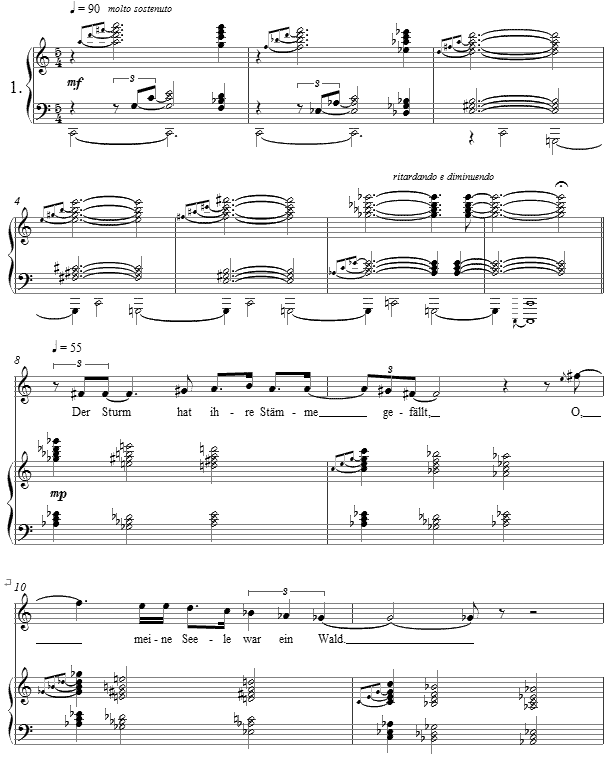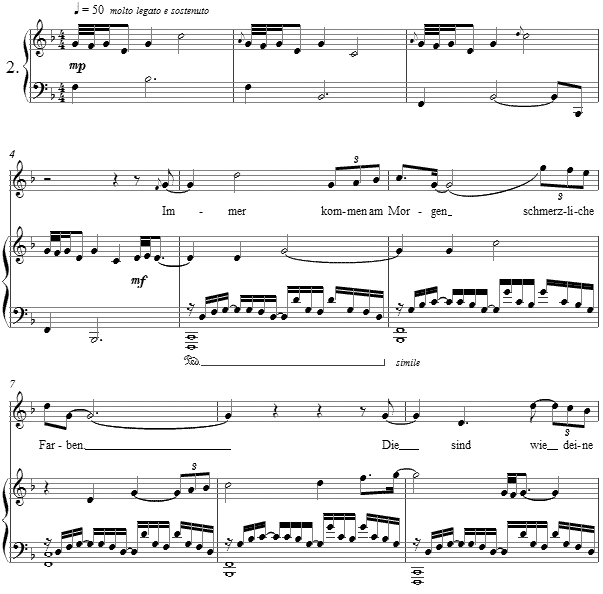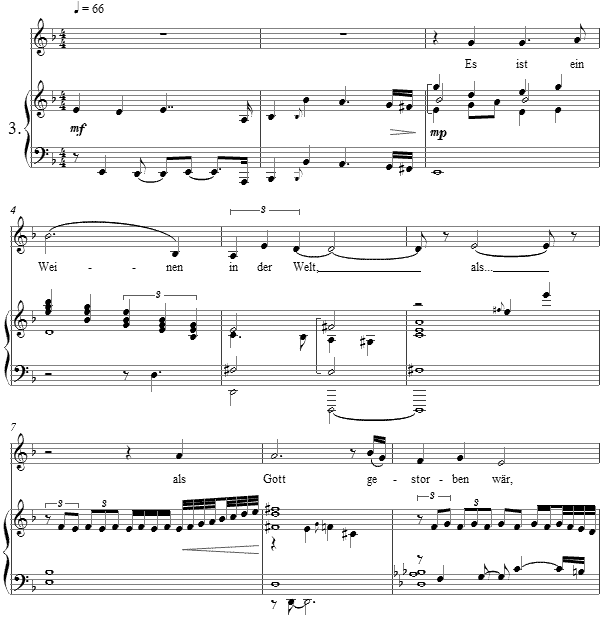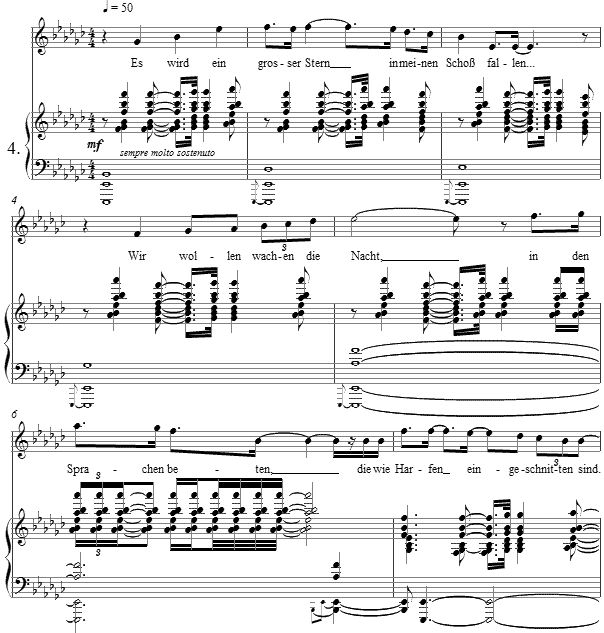Music and Texts of GARY BACHLUND
Vocal Music | Piano | Organ | Chamber Music | Orchestral | Articles and Commentary | Poems and Stories | Miscellany | FAQs
Vier Lieder von Else Lasker-Schüler - (2005)
Four songs for soprano and piano
for my colleague and friend, Gabriele Maria Ronge
i. Nun schlummert meine Seele [ circa 2' 30" ]
Der Sturm hat ihre Stämme gefällt,
O, meine Seele war ein Wald.
Hast du mich weinen gehört?
Weil deine Augen bang geöffnet stehn.
Sterne streuen NachtIn mein vergossenes Blut.
Nun schlummert meine SeeleZagend auf Zehen.
O, meine Seele war ein Wald;
Palmen schatteten,An den Ästen hing die Liebe.
Tröste meine Seele im Schlummer.from Die Gesammelten Gedichte, 1920, Leipzig
ii. Ich träume so leise von Dir [ circa 3' 30" ]
Immer kommen am Morgen schmerzliche Farben,
Die sind wie deine Seele.
O, ich muß an dich denken,
Und überall blühen so traurige Augen.
Und ich habe dir doch von großen Sternen erzählt,
Aber du hast zur Erde gesehn.
Nächte wachsen aus meinem Kopf,
Ich weiß nicht wo ich hin soll.
Ich träume so leise von dir,
Weiß hängt die Seide schon über meinen Augen.
Warum hast du nicht um michDie Erde gelassen -- sage?
from Die Gesammelten Gedichte, 1917, Leipzig
iii. Weltende [ circa 3' 30" ]
Es ist ein Weinen in der Welt,
Als ob der liebe Gott gestorben wär,
Und der bleierne Schatten, der niederfällt,
Lastet grabesschwer.
Komm, wir wollen uns näher verbergen...
Das Leben liegt in aller HerzenWie in Särgen.
Du! wir wollen uns tief küssen --
Es pocht eine Sehnsucht an die Welt,
An der wir sterben müssen.from Die Gesammelten Gedichte, 1917, Leipzig
iv. Versöhnung [ circa 3' 05" ]
Es wird ein großer Stern in meinen Schoß fallen...
Wir wollen wachsen die Nacht,
In den Sprachen beten,
Die wie Harfen eingeschnitten sind.
Wir wollen uns versöhnen die Nacht --
So viel hat Gott strömt über.
Kinder sind unsere Herzen,
Die möchten ruhen müdesüß.
Und unsere Lippen wollen sich küssen,
Was zagst du?
Grenzt nicht mein Herz an deins --
Immer färbt dein Blut meine Wangen rot.
Wir wollen uns versöhnen die Nacht ---
Wenn wir uns herzen, sterben wir nicht.
Es wird ein großer Stern in meinen Schoß fallen.
from Die Gesammelten Gedichte, 1920, Leipzig
Total duration [ circa 12' 05" ]

Else Lasker-Schüler
Else Schüler was born on February 11, 1869 in Elberfeld (now a district of Wuppertal). Her mother, Jeannette Schüler (nee Kissing) became a central figure in her poetry. Her father, Aaron Schüler, a Jewish banker, later became the inspiration for the protagonist in her drama Die Wupper.
In 1894, She married the physician Dr Jonathan Berthold Lasker (the older brother of Emanuel Lasker, for many years World Champion in chess) and moved with him to Berlin in the same year. There she worked on training as an artist. On August 24, 1899 her son Paul was born and her first poems were published. Her first full volume of poetry was called Styx and was published three years later in 1902. On April 11, 1903, she and Berthold Lasker got divorced and on November 30, she remarried to Georg Lewin to whom she gave the name Howarth Walden.
In 1906, Lasker-Schüler's first prose work, Das Peter-Hille-Buch, was published after Hille's death. Hille had been one of her closest friends. In 1907 the prose collection Die Nächte der Tino von Bagdad was published. In 1909 she published the play Die Wupper, which however was not performed straight away. With the Meine Wunder volume of poetry in 1911, Lasker-Schüler became the leading female representative of German expressionism. After separating from Walden in 1910, her second marriage also ended in divorce in 1912. Without her own source of income, Else Lasker-Schüler had to live on the financial support given to her by her friends, in particular Karl Kraus. She also met Gottfried Benn in 1912. An intense friendship developed between them which found its literary outlet in a large number of love poems dedicated to Benn. The death of her son in 1927, however, sent her into a deep depression.
Although the poet had been awarded the Kleist Prize in 1932, she emigrated to Zürich after physical attacks and faced with the threat of National Socialism. There, however, she was still banned from working. From here she made two journeys to British Mandate of Palestine (pre-state Israel) in 1934 and 1937. In 1938 she was deprived of her German citizenship and a year later in 1939 she traveled to Palestine for the third time. However, the outbreak of World War II prevented her from returning to Switzerland. In 1944 she became severely ill. After a heart attack on January 16, Else Lasker-Schüler died on January 22, 1945. She was buried on the Mount of Olives in Jerusalem.
A large part of her work is composed of love poetry, but there are also deeply religious poems and prayers. Transitions between the two are often quite fluid. Her later work above all is rich in Biblical and oriental motifs. Lasker-Schüler was very free with regard to the external rules of poetic form, however her works thereby achieve a greater inner concentration. She was also not averse to linguistic neologisms, the coining of new words.
Composed for a voice which can encompass major Wagnerian roles, the range of these settings is broad, as is the range for an Isolde or Ariadne.
i. Now slumbers my soul
The storm felled trees,
O, my soul was a forest.
Did you hear my cries?
Because your eyes stayed fearfully open.
Stars scattered night
In my forgotten blood.
Now slumbers my soul
Hesitating on tiptoe.
O, my soul was a forest;
Palms shadowed,
On the boughs hung love.
Comfort my soul in its sleep..
ii. I dream so quietly of you
Always in morning come the pain-filled colors,
that are like your soul.
O, I must think of you,
And over all bloom such sad eyes.
And I have told you of the great stars,
but you saw only the earth.
Nights awaken in my thoughts,
I know not where I shall be.
I dream so quietly of you,
White hangs the silk already over my eyes.
Why did you not put aside the earth
for me -- say?
iii. The End of the World
There is weeping in the world,
As if the dear god were dead,
And the leaden shadows that fall
Weigh heavily as the grave.
Come, we will hide ourselves together...
Life lives in all hearts
as in coffins.
You! we will kiss deeply --
There is a yearning beating in the world,
by which we must die.
iv. Reconciliation
A great star shall fall in my bosom...
We will awaken the night,
In speech pray,
like the severed harp strings.
We will reconcile ourselves in the night --
So greatly has God shined upon us.
Our hearts are children,
that must rest sweetly weary.
And our lips must kiss,
Why do you hesitate?
Do not separate my heart from yours --
Your blood always reddens my cheeks.
We will reconcile ourselves in the night --
when we embrace, we shall not die.
A great star shall fall in my bosom...
The first setting opens with a set of polytonal chords, rooted on C major as a tonic, even as the vocal line returns to its own "home" of G flat. This recollection of a lost moment of sorrow is colored through out by polytonality which by its nature cannot rest convincingly on any specific tonic region, even with the underlying insistence on C.

The second setting captures yet another recollection, and the unanswered question, "Why did you not put aside the earth for me -- say? For this the tenor line of the accompaniment sings a counterpoint to the vocal line's emotional content, as if a part of that illusive answer lying nearby, yet unrecognized.

The third setting continues the loving agony as an extension of the first two questioning settings, with the bid, "Come, we will hide ourselves together..." away from the sorrow-filled world.

Dramaturgically, the last song, with its rhapsodic accompaniment, stands enigmatically the answer following the three preceding, whether one sees this as a recollection of that time which fostered all these dark questions or as a beginning to their resolution in some future time. The last recurring phrases, "Wenn wir uns herzen, sterben wir nicht," and "Es wird ein großer Stern in meinen Schoß fallen," speak with a rising dramatic vocal line of hope for reconciliation and continuance. A last cadence in E flat minor offers the singer an optional high B-flat as a cry of longing with which to end the cycle.


Gabriele Maria Ronge
Gabriele Maria Ronge has made a wonderful international reputation as a dramatic soprano. We had worked together in a new production of Tannhäuser in Liège directed by Werner Herzog. She had suggested three of the four texts by Elsa Lasker-Schüler, and I added a fourth to complete the arch of this cycle of songs composed for her voice, as well as her persona. I owe her thanks for being introduced to the work of Lasker-Schüler, which before this time had been unknown to me. It is in my plans to compose yet more settings of her magical works.
The score to Vier Lieder von Else Lasker-Schüler is available as a free PDF download, though any major commercial performance or recording of the work is prohibited without prior arrangement with the composer. Click on the graphic below for this piano-vocal score.
Vier Lieder von Else Lasker-Schüler